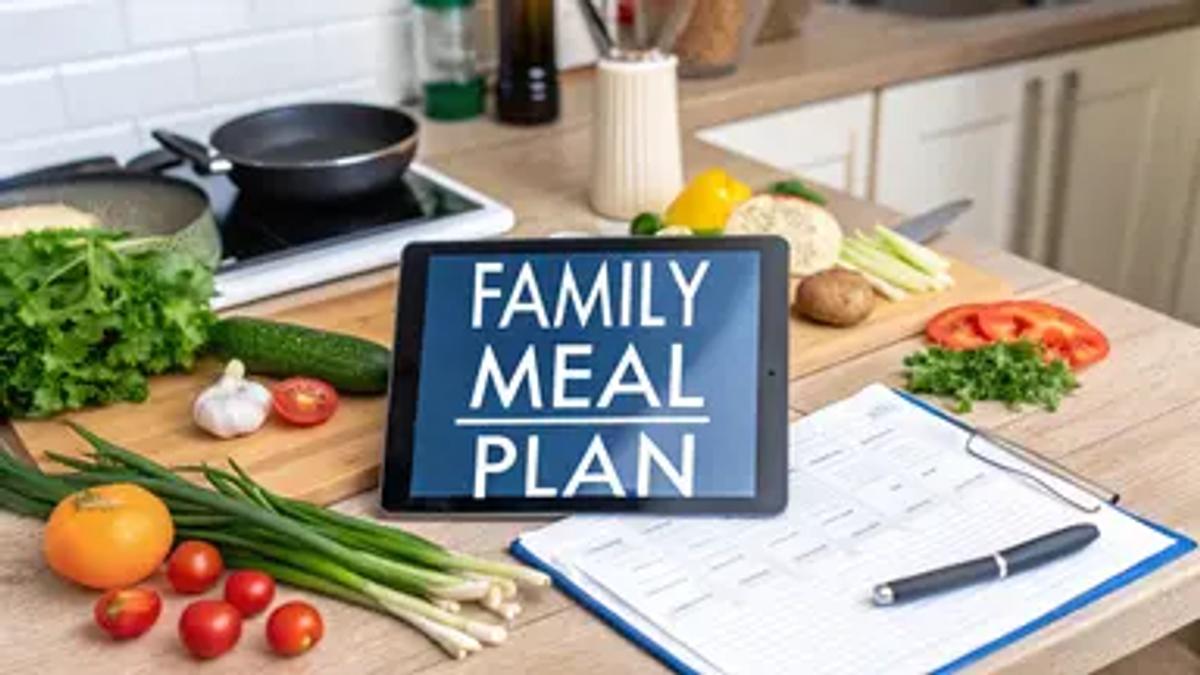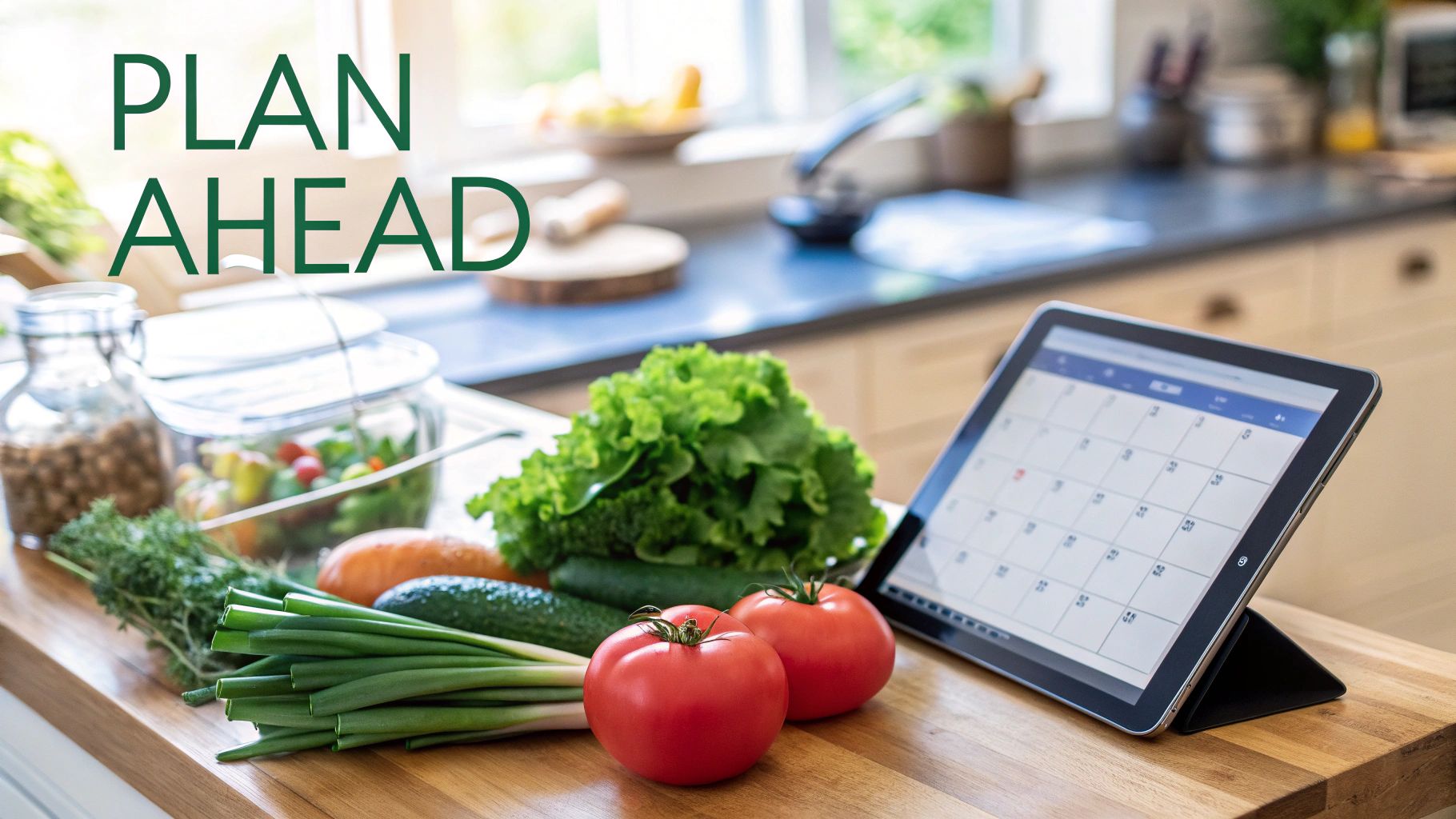Meal Planning for Busy Families A Realistic Guide
Stop the dinner chaos! Learn realistic meal planning for busy families with simple strategies, time-saving tips, and family-friendly recipes that work.
Love This Article?
Get personalized meal plans with recipes like this, automatically matched to your nutrition targets.

Meal Planning for Busy Families A Realistic Guide
Let's face it, the daily "What's for dinner?" scramble is the absolute worst. It hits right when everyone's tired, hungry, and just done with the day. Meal planning is your secret weapon to end that chaos. This isn't about creating rigid, gourmet menus that fall apart by Tuesday. It’s about building a simple, flexible system that gives you back your weeknights.
Why Bother With Meal Planning?

I get it. The thought of adding another task to your weekend to-do list sounds dreadful. But what if I told you that one hour on a Sunday could save you countless hours of stress and decision fatigue during the week? That’s the magic of meal planning. It takes the frantic 5 PM fridge-stare and turns it into a smooth, predictable routine.
Instead of hoping for a miracle to appear behind the ketchup bottle, you'll have a game plan. This isn't just about food; it's a powerful tool for your family's sanity.
The real gift of meal planning is moving the mental load of deciding what to eat from a high-stress moment (the end of a long day) to a low-stress one, when you have the headspace to think clearly.
This one simple shift sends positive ripples through your entire week. Suddenly, you're not just surviving, you're back in control of your evenings.
It's More Than Just a Menu
The perks of a solid meal plan go way beyond just having an answer for dinner. Once you find your groove, you’ll see the benefits pile up. A fascinating 2017 study revealed that meal planners aren't just more organized; they tend to have healthier, more diverse diets. This simple habit was even linked to a lower likelihood of being overweight, making it a win-win for the whole family. You can read more about the study's findings on health and meal planning for yourself.
Here's a quick look at what a good plan brings to the table:
- Slash Food Waste: You buy what you need, and you use what you buy. No more science experiments in the crisper drawer!
- Save Serious Money: A shopping list is your shield against impulse buys and the siren song of expensive takeout.
- Reduce Daily Stress: Knocking out that one big daily decision frees up so much mental energy for your family.
- Eat Healthier Meals: Planning makes it infinitely easier to serve up balanced, home-cooked food instead of reaching for processed stuff.
The Core Four Of Meal Planning Success
To get started, you don't need a complicated system. You just need to focus on four key areas that deliver the biggest impact. Think of these as the foundation of your new, stress-free dinner routine.
| Pillar | Why It Matters for Busy Families |
| Pick a Planning Day | Consistency is king. Choosing one low-stress day (like Sunday afternoon) to plan makes it a habit, not a chore. |
| Shop Your Kitchen First | This is the ultimate money-saver. Before you write a list, see what you already have to prevent buying duplicates. |
| Theme Your Nights | "Taco Tuesday" isn't just a gimmick! Themed nights (Meatless Monday, Pasta Wednesday) simplify choices and get kids excited. |
| Plan for Leftovers | Cook once, eat twice. Intentionally planning for leftovers for lunch or a "fend-for-yourself" night is a genius time-saver. |
Nailing these four pillars will give you a rock-solid starting point. From there, you can customize and perfect a system that feels like it was made just for your family.
Build Your Family's Unbeatable Recipe Playbook

Let me tell you the real secret to meal planning that actually works: it’s not some fancy app or a color-coded spreadsheet. It’s a simple, powerful list of meals your family genuinely loves. This is what I call the Recipe Playbook—your personal, curated collection of tried-and-true dinners that kills the guesswork.
Forget the Sunday night panic of scrolling through a million blogs for inspiration. Your first move is to build a foundation of meals you already know are a hit. This one step is the linchpin for any busy family because it immediately slashes decision fatigue.
Think of your Recipe Playbook as your "greatest hits" album. You're aiming for 15-20 reliable, family-approved meals you can rotate through without a second thought. This saves your brainpower for, you know, everything else you have to do.
Gather Your Family's Greatest Hits
Alright, time to play detective in your own kitchen. I promise you have more go-to dishes than you think. The goal here is to get them all written down in one spot, creating a master list that makes planning feel less like a chore and more like checking a box.
Here's how to dig them up:
- Poll the People: Just ask! Ask your partner, ask your kids—what are their absolute favorite dinners? What meal gets them excited? Write down everything, even if it's "daddy's famous scrambled eggs" or "breakfast for dinner." No judgment.
- Check Your History: Look back at your calendar or planner for the last month. What did you cook that resulted in clean plates and zero complaints? Those are pure gold. Add them to the list.
- Scour Your Digital Stash: Do a quick scroll through your saved pins on Pinterest, your bookmarked food blogs, or even the camera roll on your phone. You've probably snapped a picture of a past dinner success.
Organize for Quick Wins
You’ve got a list! Awesome. Now, let's make it actually useful. A jumbled brain-dump of meal ideas is just as overwhelming as a blank slate. The magic happens when you categorize your playbook so you can plan your week at a glance.
Think about what matters most on a chaotic Tuesday night. Speed? Simplicity?
Try grouping your meals by categories that make sense for your family. A few ideas to get you started:
- By Protein: (Chicken, Beef, Veggie, Fish)
- By Time: (Under 30 Mins, One-Pan Wonders, Slow Cooker)
- By Theme Night: (Taco Tuesday, Pizza Friday, Pasta Night)
Once it's organized, this playbook becomes your ultimate cheat sheet. When it's time to plan, you just pull a few winners from your pre-approved categories. It’s a ridiculously simple system that will honestly change your weeknights.
Master Your Low-Stress Weekly Planning Ritual
Let's get real for a second. If meal planning for busy families feels like just another soul-crushing chore, you're never going to stick with it. The secret isn't about magically finding more time—it's about turning the whole process into a quick, rewarding weekly ritual. Think of it as your superpower for a much calmer week.
This doesn't mean you need to sacrifice your entire Sunday afternoon. For some parents I know, it’s a focused 20-minute power session with a hot coffee before the house explodes into chaos. For others, it's a shared note on their phone they chip away at during a Tuesday lunch break. It's the consistency that matters, not the hours you clock.
A successful meal planning ritual isn't about some Pinterest-perfect fantasy. It's about creating a predictable anchor in your week that shuts down the "what's for dinner?!" panic before it even starts. It's a small, proactive step that pays you back every single evening.
Make It a Team Sport
My number one piece of advice? Stop doing it alone. Seriously. Turn meal planning into a quick, collaborative huddle and watch the entire dynamic change. It stops being your job and starts becoming a fun team activity.
Here are a few ways to get your crew on board:
- Theme Night Draft: Let each kid be the "manager" for a theme night. My son always picks Taco Tuesday, and my daughter is the queen of Pizza Friday. It gives them ownership.
- Digital Wish List: Start a shared note on your phone. Throughout the week, anyone can drop in meal ideas or links to recipes they find. It’s a running brain dump of deliciousness.
- Cookbook Showdown: Pull out a few favorite cookbooks, flip through them together, and let everyone vote on one or two meals for the week ahead.
This whole flow—from picking recipes to actually getting dinner on the table—can feel a lot less overwhelming when you see it laid out.

When you realize that choosing meals naturally leads to your grocery list, which then simplifies your prep work, it all clicks into a smooth, streamlined system.
Ultimately, setting a regular time for this ritual helps it become second nature. When the kids are involved in the planning (and maybe even a little prep), their buy-in goes through the roof. This simple shift makes the whole process easier and dials down the family stress levels.
If you're looking for more ideas, you can discover more family-approved meal planning strategies to help you build a system that actually sticks. By making it a team effort, you're not just planning meals—you're building a routine that works for everyone.
The Smart Shopper's Game Plan

Let's be real—a great meal plan is pretty useless without the actual groceries in your kitchen. With your week's menu finally sorted, it's time to turn that plan into a precision-guided, budget-friendly shopping list. This is where the magic happens, bridging the gap between a nice idea and a week of smooth-sailing dinners.
Your first move? The pantry audit. It sounds way more official than it is. Just take a quick peek in your fridge, freezer, and cupboards before you write a single thing down. This tiny habit is what stops you from coming home with a third jar of paprika when you already have two hiding behind the oatmeal.
The most expensive food is the food you throw away. A quick pantry check before you shop is the single easiest way to protect your grocery budget and ensure nothing gets buried in the back of the fridge.
Honestly, this is the core of smart family meal planning. It's about using what you've got before you buy more. It’s a simple mindset shift that pays off big time.
Crafting a Better Grocery List
Okay, you know what you have. Now, let's build that list. But please, don't just scribble items down as they pop into your head. A well-organized list is your best defense against aimless wandering and impulse buys. We're trying to avoid that zombie-like shuffle up and down every single aisle.
- Organize by Store Layout: Group everything by department: produce, meat, dairy, pantry staples, etc. After a couple of trips, you'll have your favorite store's layout memorized, letting you zip through your shopping in record time.
- Be Specific: Don't just write "yogurt." Write "2 large tubs plain Greek yogurt." Specificity saves you from grabbing the wrong thing in a hurry and ensures you have exactly what your recipes call for.
- Embrace Online Shopping: I get it, sometimes you just can't face the store. Using a grocery delivery service like Instacart can be a lifesaver. It forces you to stick to your list, helps you dodge those checkout-lane candy temptations, and gives you back a huge chunk of your weekend.
Tools like Meal Flow AI are incredible for this, automatically converting your meal plan into a perfectly organized shopping list that’s ready for delivery. It's a huge time-saver that handles the grunt work for you.
By putting a little strategy into your shopping, you’ll walk out of the store (or, let's be honest, click "checkout" online) with exactly what you need—no more, no less.
Your Plan Needs to Bend, Not Break
Let's be honest: life with kids is beautifully chaotic. Any meal plan that’s too rigid is doomed from the start. It only takes one late soccer practice or a sudden toddler-led boycott of chicken to throw an iron-clad schedule into total disarray.
The real secret to meal planning for busy families is creating a system that can take a punch. Your plan should be your servant, not your master.
So, instead of carving "Spaghetti on Monday" into stone, try a more fluid approach. Pick five dinners for the week, and then decide each day which one actually fits your schedule and, more importantly, your energy level.
The goal isn't to perfectly execute a flawless plan. It's to have a flexible toolkit that reduces daily effort and can withstand the beautiful chaos of family life. That's the secret to long-term success.
Find a Prep Rhythm That Works for You
The term "meal prep" often conjures images of spending an entire Sunday chained to the kitchen. It doesn't have to be that way. The key is to find a prep style that gives you the biggest time-saving payoff for the effort you put in.
Some weeks, that might mean batch-cooking a versatile protein like shredded chicken. Other weeks, it might just be chopping a mountain of veggies. It all counts.
This is all about finding smart efficiencies. According to recent data, American adults spend an average of 37 minutes a day on meal prep and cleanup. For families with kids, that number can easily creep higher. A flexible prep strategy is your best defense. You can discover more about how Americans spend their time in the kitchen and see why shaving off even a few minutes matters.
Here are a few prep styles that have saved my sanity more than once:
- Ingredient-Level Prep: Don't cook full meals, just prep the components. Cook a big batch of quinoa, chop all your onions and peppers for the week, or get a few chicken breasts marinating in the fridge. This makes throwing dinner together so much faster.
- Theme Nights: This is my favorite way to add structure without being too strict. "Taco Tuesday" and "Pizza Friday" are classics for a reason—they make decisions easier and get the kids excited.
- Cook Once, Eat Twice: This is the easiest win in the book. Always make extra. Leftover roasted chicken from Monday effortlessly becomes delicious chicken tacos on Wednesday.
By letting go of perfection and embracing a more relaxed approach, you build a system that genuinely supports your family, no matter what curveballs the week decides to throw your way.
Alright, let's ditch the robot and give this section a human touch. Here's a rewrite that sounds like it's coming from a fellow parent who's been in the dinner trenches.
***
Dodging the Dinner-Time Curveballs
So you’ve got your plan, your recipes are lined up... and then life happens. The soccer practice runs late, the toddler decides they now hate chicken, and your perfect plan goes right out the window. Sound familiar?
Don't sweat it. Hitting these roadblocks is completely normal. The real secret to successful meal planning isn't having a flawless system; it's knowing how to roll with the punches. This is your guide to staying sane when the dinner plan gets a little... well, chaotic.
The most successful meal planners aren't the ones who never mess up. They're the ones who have a backup plan for when things inevitably go sideways. Flexibility is your superpower.
Instead of chasing a "perfect" week, just aim for a week that feels doable. That means expecting the unexpected and having a few tricks up your sleeve.
"But I Don't Liiiike That!" — Taming the Picky Eater
Ah, the nightly chorus of "Eww, what's that?" You are so not alone on this one. The goal isn't to turn into a short-order cook, but to give them some skin in the game.
Remember that Recipe Playbook we talked about? Get them involved! When kids help pick the meals, they feel like they have some control and are genuinely more excited to eat what's on their plate.
Here are a couple of my favorite tactics that have saved many a dinner:
- Build-Your-Own-Anything. This is a total game-changer. Instead of a pre-made dish, lay out all the ingredients and let everyone assemble their own. Think taco bars with all the fixings, personal pizza nights, or pasta stations where they choose their own sauce and toppings.
- The "No-Fight" Side Dish. Always have one or two super simple, healthy sides you know they'll eat. Sliced cucumbers, a hard-boiled egg, or some steamed edamame can be a lifesaver when you're serving something new or adventurous. It takes the pressure off everyone.
What to Do When Your Schedule Explodes
This is the big one. The after-school activity gets moved, you have to work late—suddenly, that 45-minute meal you planned is a joke. The answer? A flex plan.
Instead of locking meals into specific days (Taco Tuesday, anyone?), just create a list of five or six dinners for the week. Each morning, take a quick peek at the day's agenda and pick the meal that actually fits the time you have. It’s a simple mindset shift from a rigid schedule to a flexible list, but it makes all the difference.
And for those nights that are a complete dumpster fire? You need an "emergency meal" you can throw together in minutes with zero brainpower.
My Go-To Emergency Meals
| Meal Idea | Why It's a Lifesaver |
| Breakfast for Dinner | Scrambled eggs and toast. It's fast, everyone loves it, and it costs next to nothing. |
| Frozen Ravioli Rescue | A bag of quality frozen pasta and a jar of good sauce feels like a real meal, but it's on the table in under 15 minutes. |
| "Fridge Forage" Quesadillas | Got leftover chicken, some sad-looking veggies, and a bit of cheese? You've got dinner. |
This way, your plan bends instead of breaks, no matter what your week throws at you.
---
Ready to make meal planning genuinely effortless? **Meal Flow AI** does the heavy lifting for you. It builds personalized meal plans your whole family will actually eat and even creates a shopping list you can send straight to Instacart. Stop dreading the "what's for dinner" question and transform your weeknights with Meal Flow AI today!